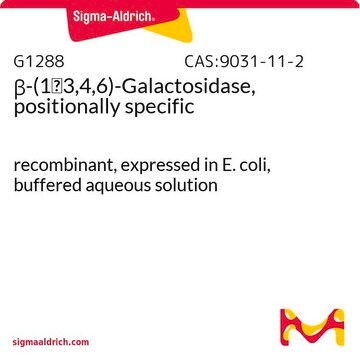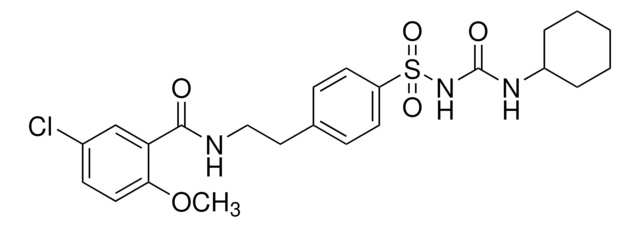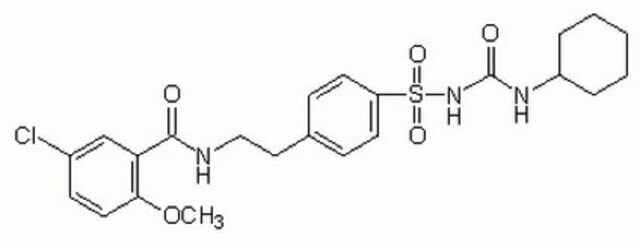G2295
Glimepiride
≥98% (HPLC), solid
About This Item
Produits recommandés
Niveau de qualité
Pureté
≥98% (HPLC)
Forme
solid
Couleur
white
Pf
212.2-214.5 °C
Solubilité
DMSO: >10 mg/mL
Auteur
Sanofi Aventis
Température de stockage
room temp
Chaîne SMILES
CCC1=C(C)CN(C(=O)NCCc2ccc(cc2)S(=O)(=O)NC(=O)N[C@H]3CC[C@H](C)CC3)C1=O
InChI
1S/C24H34N4O5S/c1-4-21-17(3)15-28(22(21)29)24(31)25-14-13-18-7-11-20(12-8-18)34(32,33)27-23(30)26-19-9-5-16(2)6-10-19/h7-8,11-12,16,19H,4-6,9-10,13-15H2,1-3H3,(H,25,31)(H2,26,27,30)/t16-,19-
Clé InChI
WIGIZIANZCJQQY-RUCARUNLSA-N
Informations sur le gène
human ... ABCC8(6833) , KCNJ1(3758) , KCNJ11(3767)
Vous recherchez des produits similaires ? Visite Guide de comparaison des produits
Description générale
Application
- as a hypoglycemic drug to test its anti-diabetic functionality in human umbilical vein cells (HUVECs)
- as a sulfonylurea ATP-sensitive potassium channel (KATP) channel inhibitor in breast cancer MDA-MB-231 cells
- in glucose-stimulated insulin secretion (GSIS) assays of neonatal islet-like cell clusters (NICCs) to test its effect on insulin secretion
Actions biochimiques/physiologiques
Caractéristiques et avantages
Mention d'avertissement
Warning
Mentions de danger
Conseils de prudence
Classification des risques
Repr. 2
Code de la classe de stockage
11 - Combustible Solids
Classe de danger pour l'eau (WGK)
WGK 3
Point d'éclair (°F)
Not applicable
Point d'éclair (°C)
Not applicable
Équipement de protection individuelle
Eyeshields, Gloves, type N95 (US)
Certificats d'analyse (COA)
Recherchez un Certificats d'analyse (COA) en saisissant le numéro de lot du produit. Les numéros de lot figurent sur l'étiquette du produit après les mots "Lot" ou "Batch".
Déjà en possession de ce produit ?
Retrouvez la documentation relative aux produits que vous avez récemment achetés dans la Bibliothèque de documents.
Les clients ont également consulté
Notre équipe de scientifiques dispose d'une expérience dans tous les secteurs de la recherche, notamment en sciences de la vie, science des matériaux, synthèse chimique, chromatographie, analyse et dans de nombreux autres domaines..
Contacter notre Service technique








